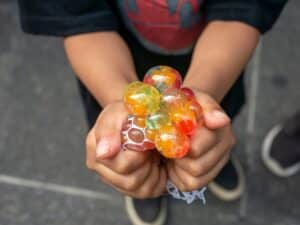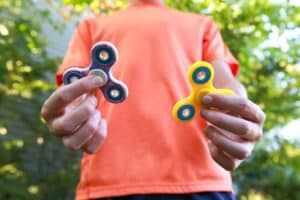The Importance of Autism Toys
Autism toys play a crucial role in supporting the development of autistic children by addressing their unique needs. These toys help improve communication, social skills, and cognitive growth engagingly.
Many autistic children benefit from toys that cater to their sensory and developmental requirements. Carefully chosen toys can make playtime both enjoyable and therapeutic for kids on the autism spectrum.
Sensory Toys for Autism Spectrum Disorder
Sensory toys are designed to provide calming and stimulating sensory input for children with autism spectrum disorder. These toys help manage sensory issues and improve self-regulation skills effectively.
Popular sensory toys include squishy stress balls, textured blocks, and fidget spinners, which engage multiple senses. These toy options are beneficial for kids who experience sensory processing challenges.
Success Stories
“Move Up ABA has been a lifeline for our family. Before starting therapy, our son struggled with daily routines and communication. Now, he’s more independent and even initiated a conversation with a classmate for the first time! The progress we’ve seen in just six months is truly remarkable.”
- Emily R., Silver Spring, Accountant
“As a single dad, I was overwhelmed trying to manage my child’s behavior. The Move Up ABA team not only provided amazing support for my little girl but also taught me practical strategies to use at home. Their in-home sessions fit perfectly with our busy schedule. I’m so grateful for their patience and expertise.”
- Michael T., Rockville, Middle School Teacher
“We were hesitant about starting ABA therapy, but Move Up ABA’s approach put us at ease from day one. Our twins have made incredible strides in their social skills and self-regulation. The therapists are like extended family now, and we couldn’t be happier with our decision to work with them.”
- Aisha and James L., Simpson, Police Officers
Ready to start your child's journey to success? Schedule a free consultation today! 📞 Call (410) 497-8865.
Fat Brain Toys and Their Benefits
Fat Brain Toys offers various learning toys to support autistic children’s development. Their products emphasize motor skills, problem-solving, and creativity through fun and engaging designs.
Fat Brain Toys are ideal for improving fine motor skills and encouraging pretend play. With a wide age range in their collections, these toys meet the needs of children at different developmental stages.
Building Fine Motor Skills with Autism Toys
Toys that enhance fine motor skills are essential for many autistic children to develop hand-eye coordination and dexterity. Activities like stacking, threading beads, and puzzle-solving offer valuable skill-building opportunities.
These toys also improve finger strength and control, laying the groundwork for tasks like writing and buttoning clothes. Focusing on motor development promotes confidence in kids on the autism spectrum.
The Role of Play Skills in Development
Play skills are vital for fostering social interaction and creativity in autistic children. Autism toys that encourage pretend play, such as dollhouses or kitchen sets, help children explore imaginative scenarios.
Interactive toys like board games or cooperative building sets also support the development of turn-taking and teamwork skills. These toys provide opportunities for children to engage with others in meaningful ways.
Water Toys and Water Play for Sensory Input

Water toys are excellent sensory play tools, offering calming and stimulating experiences for autistic children. Activities like pouring, splashing, and floating toys help children engage in water play.
Water play can improve sensory processing, self-regulation, and motor skills in kids with sensory issues. Popular options include water tables, bath toys, and sprinklers for safe and fun play.
Toys That Address Sensory Issues
Toys designed to address sensory issues help autistic children explore textures, sounds, and movements in a controlled way. Weighted blankets, sensory mats, and vibrating toys are calming sensory aids.
These toys provide predictable sensory input, helping kids reduce anxiety and focus on learning. Incorporating such toys into play routines can significantly enhance a child’s self-regulating ability.
Social Skills Development Through Toys
Toys that promote social skills help autistic children learn how to interact with others in a structured setting. Role-playing toys, group games, and storytelling sets effectively build these skills.
Such toys encourage communication, empathy, and collaboration, which are essential for navigating social environments. Autistic children benefit from the guided opportunities to practice interpersonal skills through play.
The Importance of Learning Toys for Autistic Kids
Learning toys cater to the cognitive and developmental needs of kids on the autism spectrum. These toys often integrate educational concepts like numbers, colors, and problem-solving activities.
Popular learning toys include building blocks, interactive books, and logic puzzles, which make learning enjoyable. Children can use these toys to enhance their cognitive growth in a playful and stress-free manner.
Choosing the Right Autism Toys for Your Child
Selecting suitable toys for autistic children requires understanding their preferences, sensory needs, and developmental goals. Consider factors like sensory input, motor skill development, and social engagement.
Consider the child’s age range and unique interests to find toys that will hold their attention and provide lasting benefits. Thoughtfully chosen toys can make a significant difference in supporting a child’s growth and happiness.
Toys for Enhancing Problem-Solving Skills
Problem-solving toys, such as mazes and puzzle games, help autistic children build critical thinking and reasoning abilities through hands-on activities. These toys encourage children to think logically and persist through challenges.
Interactive problem-solving toys also support cognitive flexibility, helping kids adapt to different scenarios. These activities are essential for fostering independence and boosting confidence in many autistic children.
The Role of Musical Toys in Autism Development

Musical toys engage autistic children in exploring sounds and rhythms while improving sensory integration. Instruments like xylophones, drums, and keyboards encourage creativity and auditory skills.
Playing musical toys can also support self-regulation by offering a soothing sensory experience. Additionally, musical activities enhance motor coordination and timing in a fun, interactive manner.
Exploring Outdoor Toys for Autism
Outdoor toys promote physical activity and sensory engagement for kids with autism spectrum disorder. Items like trampolines, swings, and climbing structures help children build gross motor skills.
Outdoor play also provides opportunities for social interaction and stress relief, benefiting autistic children. These activities combine exercise with sensory exploration in natural settings.
Using Visual Toys for Communication Skills
Visual toys like flashcards, picture books, and communication boards are excellent tools for developing language and understanding. These toys help autistic children express themselves and comprehend new concepts.
Interactive visual aids also support learning by linking images with words, fostering stronger connections between language and meaning. These resources are beneficial for kids with limited verbal skills.
Toys for Encouraging Emotional Expression
Emotion-focused toys help autistic children recognize and express their feelings in a safe environment. Emotion flashcards or mood journals provide tools for understanding and communicating emotions.
These toys also aid in teaching empathy and recognizing others’ emotions, which are vital for social interactions. Emotional awareness activities contribute to better relationships and self-regulation.
STEM Toys for Autistic Kids
STEM (science, technology, engineering, and math) toys engage autistic children with educational concepts. Building sets, coding games, and science kits encourage curiosity and problem-solving.
These toys also help develop motor and cognitive skills while fostering creativity and a love for learning. STEM toys are ideal for nurturing logical thinking and hands-on experimentation.
Adaptable Toys for Different Age Ranges
Toys that adapt to various age ranges ensure they meet the developmental needs of autistic children at different stages. Adjustable features, like difficulty levels, make toys versatile for extended use.
These toys grow with the child, allowing them to build skills progressively while maintaining interest. Versatility in toys provides value and supports ongoing development.
Fidget Toys for Focus and Calming

Fidget toys help autistic children manage anxiety and focus by providing tactile stimulation. Items like spinners, cubes, and stretchy bands offer calming sensory input during stressful situations.
These portable toys can be used in various settings to help children regulate emotions and maintain attention. Fidget toys are valuable tools for improving concentration and self-regulation.
Bath Toys for Fun and Learning
Bath toys turn water play into a sensory-rich learning experience for kids with autism. Floating toys, squirrels, and color-changing items engage children while building motor skills.
These toys also encourage self-care routines, such as bathing, by making the experience enjoyable and less overwhelming. Bath toys provide both entertainment and developmental benefits.
Educational Board Games for Autism
Educational board games teach essential skills like turn-taking, strategy, and collaboration. Games tailored for autistic children focus on enhancing cognitive and social abilities.
Playing board games fosters family bonding and reinforces concepts like numbers, colors, and shapes. These activities are a great way to combine learning and fun in a group setting.
Building Gross Motor Skills with Autism Toys
Toys like balance boards, jump ropes, and ride-on vehicles are excellent for improving gross motor skills in autistic children. These activities help develop strength, coordination, and spatial awareness through active play.
Sensory Toys for Autistic Children in Calming Environments
Sensory-friendly toys such as weighted animals, soft plushies, and calming jars help create a soothing atmosphere for autistic children. These toys provide gentle sensory input to reduce anxiety and encourage relaxation.
Role of Construction Toys in Development
Construction toys, including blocks, magnetic tiles, and building kits, inspire creativity while enhancing spatial and problem-solving skills. These toys also improve fine motor coordination as children manipulate and assemble components.
Educational Toys for Early Literacy
Early literacy toys like letter tiles, alphabet puzzles, and phonics games help children with autism develop foundational reading skills. These tools make learning letters and sounds engaging and interactive for young learners.
Texture-Based Toys for Sensory Exploration
Texture-based toys, such as kinetic sand, fabric squares, and textured balls, promote sensory exploration in autistic children. These toys offer tactile stimulation, which can help children become more comfortable with different sensations.
Interactive Toys for Social Engagement

Interactive toys, such as talking dolls, action figures, and cooperative playsets, are designed to foster meaningful social interactions among autistic children.
These toys provide opportunities for children to engage with others in a playful yet structured environment, helping to build essential social skills.
By encouraging activities like turn-taking, role-playing, and collaboration, these toys create a setting where children can practice and enhance their ability to interact with peers. For instance, talking dolls can initiate dialogues that prompt children to respond, improving their communication skills. Similarly, action figures and playsets encourage imaginative storytelling and teamwork, as children work together to create scenarios and resolve challenges.
These activities not only make learning social cues enjoyable but also help children develop confidence and a sense of belonging in group settings.
Lightweight Portable Toys for On-the-Go Play
Portable toys like small fidget cubes, travel puzzles, and compact sensory kits keep children entertained during outings. These toys provide calming and engaging activities, making transitions and travel less stressful for autistic kids.
Conclusion
Autism toys provide a valuable way to support the development of autistic children by catering to their unique sensory, motor, and social needs. These toys help children improve communication, self-regulation, and problem-solving skills while making playtime enjoyable and productive.
Parents and caregivers can foster meaningful growth by selecting toys tailored to a child’s age range, interests, and developmental goals. Whether through sensory play, learning activities, or social engagement, these toys create opportunities for children to thrive in various settings.
Integrating autism toys into daily routines promotes confidence and independence in autistic children. As they develop critical life skills through play, children gain the tools to navigate challenges and build fulfilling, connected lives.






